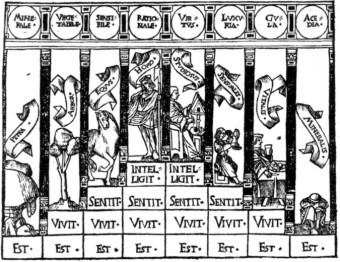.jpg)
History 442/542
Popular Culture
in Early Modern Europe:
Ritual, Religion, Power (1400-1750)
.jpg)
History 442/542 Popular Culture in Early Modern Europe: Ritual, Religion, Power (1400-1750) |
| The Stages of Man (1510), by Charles de Bouelles
(c.
1470-1553)
This diagram illustrates as well as any a humanist conception of human virtues. It establishes a series of parallels between incremental states of being in nature, with its correponding verb, and their counterpart in the human condition. Thus simply exist (Est), like a stone, is to be like a sluggard; to merely live (Vivit), like a plant, corresponds to a life of gluttony; to merely feel (Sensit), as a horse can, is to be nothing more than a vain person (Sensualis), to live by the dictates of Luxuria; but to understand (Intellegit), is a human does or ought to, is live as a scholar. The summit of human possibility, in short, is to live the life of the mind. This was the framework for Bouelles study of the human condition, Liber de sapiente, published in 1510. |

The Stages of Man, from Charles de Bouelles, Liber de sapiente (1510). |